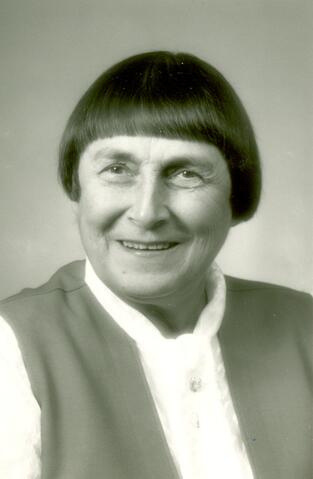
Title and statement of responsibility area
Title proper
Dr. Sylvia Fedoruk - Portrait
General material designation
- Graphic material
Parallel title
Other title information
Title statements of responsibility
Title notes
Level of description
Item
Reference code
Edition area
Edition statement
Edition statement of responsibility
Class of material specific details area
Statement of scale (cartographic)
Statement of projection (cartographic)
Statement of coordinates (cartographic)
Statement of scale (architectural)
Issuing jurisdiction and denomination (philatelic)
Dates of creation area
Date(s)
-
1986 (Creation)
Physical description area
Physical description
1 photograph : b&w ; 8.5 x 6 cm
Publisher's series area
Title proper of publisher's series
Parallel titles of publisher's series
Other title information of publisher's series
Statement of responsibility relating to publisher's series
Numbering within publisher's series
Note on publisher's series
Archival description area
Name of creator
Custodial history
Scope and content
Head and shoulders image of Dr. Sylvia Fedoruk, ninth and first woman Chancellor, 1986-1989.
Bio/Historical Note: One of Canada’s foremost medical biophysicists, Dr. Sylvia Fedoruk (1927-2012) was the only woman conducting medical-physics research in Canada in the 1950s. Her groundbreaking achievements have earned her worldwide recognition, bringing honour to Saskatchewan, her home province, and to Canada. Working with Dr. Harold Johns, Dr. Fedoruk served on a team of scientists involved in the development of one of the world's first cobalt-60 unit (the “Cobalt Bomb”), and one of the first nuclear medicine scanning machines, which pioneered the curative treatment of cancer using high intensity radioactive cobalt in humans. She became chief medical physicist for the Saskatchewan Cancer Foundation. The world’s first non-commercial cobalt-60 therapy unit went into operation at the University of Saskatchewan in 1951 – the same year Dr. Fedoruk submitted her thesis in physics. Within ten years, cobalt radiation had become the standard of radiation therapists worldwide, and it was estimated that by the end of the century it had helped more than 70 million people. Later in her career, Dr. Fedoruk contributed to the development of the Dosimeter, allowing doctors to control the amount of radiation that each cancer patient received. She also participated in the development of one of the first whole body scanning machines that used radioactive nuclides to help detect cancers of the thyroid and liver. With an academic career that spanned 35 years, Dr. Fedoruk was the first woman member of the Atomic Energy Control Board of Canada and served as a consultant on nuclear medicine to the International Atomic Energy Agency, among other advisory boards throughout the 1960s. She was Chancellor at the University of Saskatchewan (1986-1989), and the first female Lieutenant Governor of the province (1988-1994). Dr. Fedoruk was appointed an Officer of the Order of Canada in 1986. She was awarded the Saskatchewan Order of Merit (1986), the Queen’s Silver Jubilee Medal (1977), a Canada 125th Commemorative Medal (1992), five honourary doctorates from Canadian universities, among other honours. Dr. Fedoruk died 26 September 2012 in Saskatoon at age 85. The city of Saskatoon honoured her by naming Fedoruk Drive, located in the northeast sector of the city, after her. Sylvia Fedoruk Public School, located in the Evergreen neighbourhood, opened in 2017. Award-winning author Dr. Merle Massie wrote a biography (2020) of the life and career of Dr. Fedoruk, encompassing some of the most ground-breaking scientific, athletic and public transformations of the twentieth century.
Notes area
Physical condition
Immediate source of acquisition
Arrangement
Language of material
Script of material
Location of originals
Availability of other formats
Restrictions on access
Terms governing use, reproduction, and publication
Photographer: Gibson
Other terms: Copyright: University of Saskatchewan

